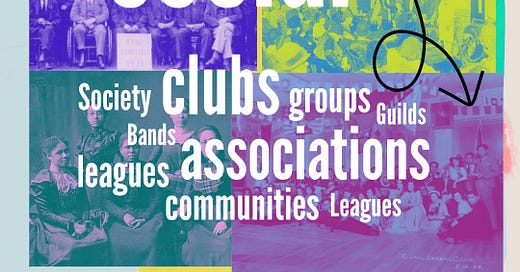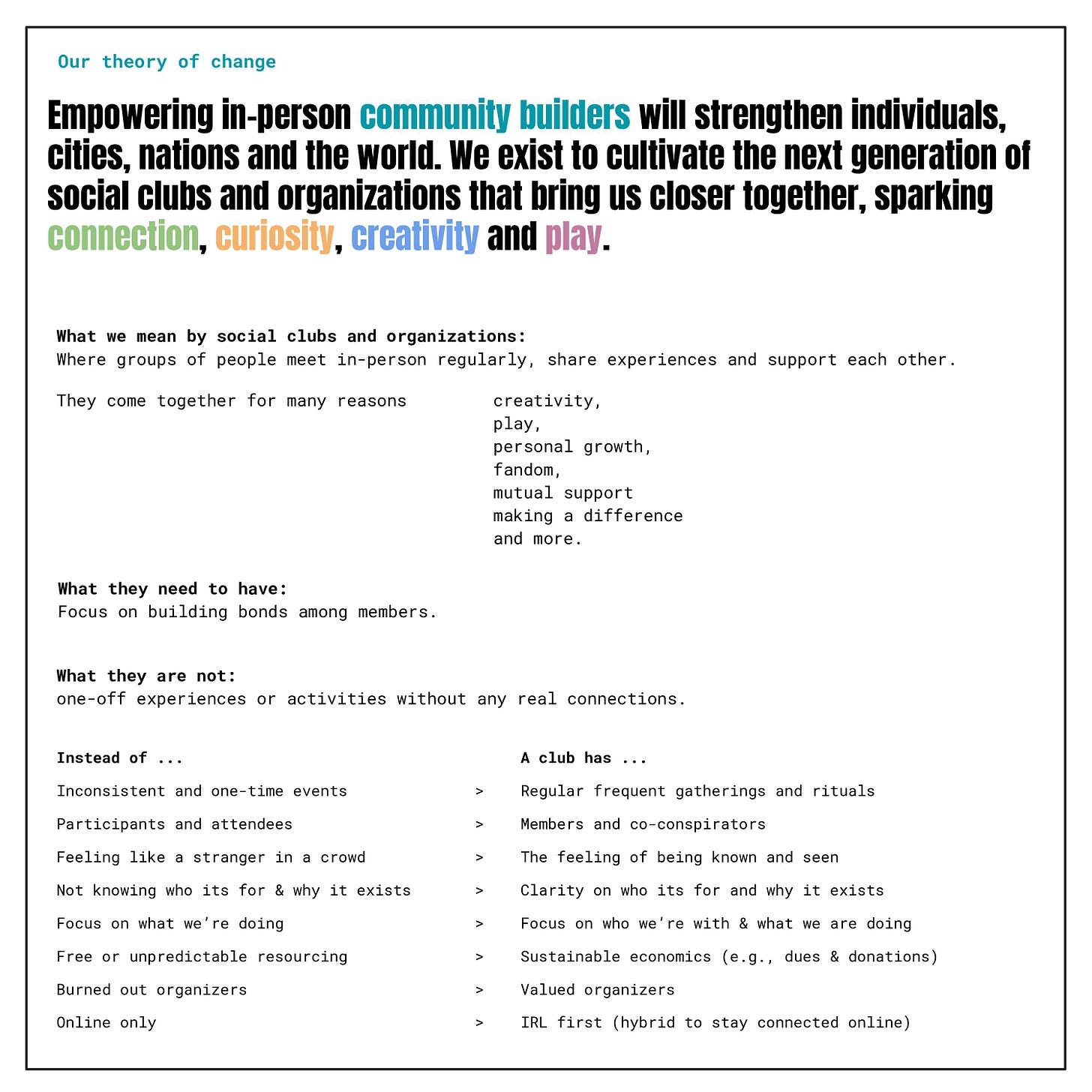When Jack first entered Geek House’s biweekly learn-in-a-bar event, he knew he had found his people. “I never felt so welcomed in my life,” he says. “Here, everyone from scientists to carpenters laugh and learn together. What bonds us is a deep curiosity about the world.” Geek House quickly became a cherished part of Jack’s life – it’s where he met his closest friends and his partner.
Attendance briefly dwindled after COVID and the bar threatened to evict the group. To save Geek House Jack put posters up in local coffee shops, invited strangers on the BART to show up, and even spent $1200 of his own money on instagram ads. “It’s a constant struggle to get people’s attention – I’m up against Youtube, TikTok, and Netflix.”
Despite the love of hundreds of participants each month, Geek House feels like it’s always on precarious footing. Jack spends hours each day outside of his 9-to-5 to keep it afloat. “I do everything from onboarding new members, hosting, planning, logistics, marketing and on-day execution.”
So far Jack has managed to keep Geek House alive through sheer grit, but he is an exception. Thousands of other local IRL builders are burning out. “If we had more resources, I would hire someone to help out, formalize processes and make this community more durable. But I don’t know how to ask for money. It’s awkward.”
Sometimes Jack questions if it’s all worth it. “When nerds are here they feel like rockstars. We have created a place where people feel they belong. Nothing makes me feel more alive.
But I don’t know how long I can continue to do this.”*
How did we get here?
Our community builders are under-resourced, overstretched, emotionally drained and under-appreciated. They're adding immense value but hesitate to ask for resources. They're bringing us together, but they’re doing it alone. They wonder if anyone cares.
To all of the Jacks out there trying to keep the lights on – we care.
Now more than ever - we need more Jacks in the world. We need to empower them, celebrate them and support them. We need them to run more IRL social clubs, associations, leagues, guilds, communities ...
But how?
This question puzzled us deeply. So we talked to dozens of community builders, hundreds of people, and many many experts over the last few months to realize that IRL community building is ridiculously hard and financially unviable today.
That’s why we are launching the Build IRL accelerator in Summer 2024 – a community of practice to support the next generation of in-person community builders in the San Francisco Bay Area.
Can a few people with an idea shake things up in the social world? Buckle up.
Wait, where are the social clubs?
It wasn’t always like this. America was a nation of clubs and associations. When Alexis de Tocqueville, the French philosopher, visited the United States in the 1830s he found it remarkable how frequently Americans came together in social groups. He noted, "Americans of all ages, all stations in life, and all types of disposition are continuously creating associations."
We were members and joiners.
Things started to change in the 1970s. Robert Putnam saw early signs. In his book "Bowling Alone", he warned of the impending social recession and its consequences. By the 1990s, attendance at clubs and churches had plummeted by more than half.
In the 2000s, the internet brought with it new hopes of reviving our communities. Social media promised to make the world smaller, and bring loved ones closer. Until, of course, they sold our attention to make profits. We stopped hanging out in the real world. In-person social time has dropped by over 66% in the last 2 decades. And only 16% of Americans feel ‘very attached’ to their local community.
We have created a lonely world. And, it’s ruining our health, society and democracy.
1 in 2 Americans feel lonely. Young adults 18 to 35 are worst affected.
Youth mental health crisis is skyrocketing. In 2023 the US surgeon general called loneliness a public health crisis.
Our trust in each other and the government has plummeted. 55% of us think that the country will become more divided in the next 5 years.
We lost friends. Americans saw a massive drop in the number of close friends.
But, the tide is turning.
Gen Z and Millennials are seeking more IRL. High end social clubs are on the rise. Flip phones are back in. We want to spend more on experiences, less on stuff. Remote work is forcing everyone to seek in-person connection and community elsewhere.
Despite this, existing social clubs are struggling to survive and not enough new ones are being created. Why?
Because IRL community building is ridiculously hard and financially unviable today.
IRL builders are superhuman heroes who do this as a labor of love. They have limited to no support. Unsurprisingly, they are burning out.
A long list of tech startups (let’s call it the Meetup 2.0 graveyard) think what they need is a fancier “member management tool” - messaging, member profiles, etc.
They are wrong!
What community builders told us they actually need is:
Funding & resources (and a way to ask for it that’s not awkward)
New member outreach for their niche (insta is crowding out local players)
Execution support (finding space, planning, marketing, logistics and chores)
Patronage and encouragement (to know that their work matters)
“The Money Dilemma.”
Community builders want to serve, not sell.
Many are hesitant (even ashamed) to ask for money. Often they don’t get paid, and worse, they don’t ask for the resources needed to sustain their work.
For centuries, member dues and donations have been standard practice. Social organizations, both non-profit and for-profit, openly discussed funding and resources with their members. Clubs like the Elks and Rotary had millions of dues paying members. We invested in our communities.
But platforms like MeetUp and Facebook watered down what it means to “join” a community. We've become accustomed to superficial memberships, merely 'following' groups without truly engaging, and settling for less than what true community can offer our lives.
Social media devalued the role of community in our lives, making us expect it should be free. We suddenly stopped investing in our communities.
The result
There is a mismatch.
The amount of resources and support we allocate as a society to community building doesn’t match the amount of value it actually delivers.
We forget that community building is REAL work that takes time, effort and money.
Creating a New Paradigm for Community Building
We exist to fuel a new breed of builders creating the next generation of social clubs and in-person communities.
Build IRL accelerator in San Francisco is our first step towards this goal.
The accelerator will bring together driven and passionate builders creating social clubs and IRL communities in the SF Bay Area — unified by the mission of fostering in person connections.
Our focus is to help them really take off. For most, this translates into helping them with one of three things:
nurturing a community that members love, and that is true to their story
creating a economic model to gather funds to sustain it
operations and logistics to deliver it without burning them out
We will surround them with peers and experts - all dedicated to their success. We will immerse ourselves in their challenges, build a community of practice and co-create solutions that will help many more builders beyond the accelerator in years to come.
Ultimately, we want to make this work more visible, celebrated and attractive.
Who are we?
We are curious, playful and mission-driven builders who want to create a dent in this world.
Saumya wants to create a healthier and happier world for her daughter. She spent the last decade working in healthtech and biotech. She hosts the Loneliness Busters podcast and her blogs on the topic have 1M+ views.
Colton has spent the last 11 years launching and scaling social impact businesses. He is passionate about creating solutions that help people build fulfilling, thriving lives.
-Colt & Saum
Contact us if you want to partner or learn more: team@buildirl.com
*Names in the user story have been changed to protect privacy :)









So much of this resonates with me. As someone who has spent years building and nurturing a community every one of the 4 pain points listed at the top hit close to home. I know the value my community creates for our “challengers” as we call them but the time, effort, money, and moments of questioning “is it worth it” make it hard to keep things going at times. Wishing you all the best on this project! Hope to see your efforts expand to nyc - we need you here too!